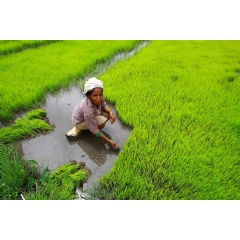New UN-backed open-source tool will support community resilience-building
The United Nations Food and Agriculture Programme (FAO) is teaming up with a coalition of partner agencies to develop a new data crunching tool to help national governments, development and relief organizations in their efforts to prevent and respond to crises such as animal diseases, plant pests and even conflict.
In a news release out today, FAO announced that the partnership, among some 15 entities, has launched the Index for Risk Management (InfoRM), which sheds new light on what drives crises and what communities need in order to face them.
Each year millions of people dependant on agriculture, forestry and fisheries are confronted by droughts, floods, plant pests or animal diseases, and conflict. When that happens, the livelihoods of communities can be left in tatters, while disruptions to food production and distribution undermine the food security of nations and entire regions.
InfoRM was designed to help identify where and why crises are likely to occur. The index builds up a picture of risk by bringing together some 50 different indicators measuring three dimensions of risk: hazards and exposure of people, vulnerability of communities to those hazards, and their capacity to cope with them.
This data is synthesized into a consolidated, simple risk profile for each country, which includes natural and human hazards, vulnerability and lack of coping capacity. Currently, InfoRM covers 191 countries.
“Having such a multi-hazard risk assessment tool available is key to help us improve the way we understand risk in different countries, and to strengthen FAO’s efforts to build resilience where it is needed the most,” according to Dominique Burgeon, Coordinator of FAO’s resilience work. “It will help us support the resilience of communities and food systems to withstand challenges, before they arise.”
The information crunched by InfoRM comes from a variety of international organizations and academic institutes.
FAO itself feeds the system data on average dietary supply adequacy, prevalence of undernourishment, domestic food price level and volatility as well as information on drought risk using its remote-sensing based Agricultural Stress Index (ASI).
InfoRM is a collaboration of the Inter-Agency Standing Committee Task Team for Preparedness and Resilience and the European Commission. It was officially launched on 19 November in Geneva.
( Press Release Image: https://photos.webwire.com/prmedia/7/193367/193367-1.jpg )
WebWireID193367
This news content was configured by WebWire editorial staff. Linking is permitted.
News Release Distribution and Press Release Distribution Services Provided by WebWire.
